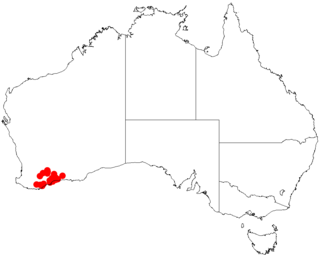
Acacia effusifolia is a shrub or tree belonging to the genus Acacia and the subgenus Juliflorae. It is native to an area in the Mid West and the Wheatbelt regions of Western Australia.

Acacia fauntleroyi is a shrub or small tree belonging to the genus Acacia and the subgenus Juliflorae that is endemic to a part of south western Australia.

Acacia tetraneura is a shrub belonging to the genus Acacia and the subgenus Juliflorae that is endemic to western Australia.

Acacia andrewsii is a shrub belonging to the genus Acacia and the subgenus Phyllodineae that is endemic to western Australia.

Acacia cedroides is a shrub belonging to the genus Acacia and the subgenus Phyllodineae that is endemic to Western Australia.

Acacia dentifera, commonly known as tooth-bearing acacia, is a shrub belonging to the genus Acacia and the subgenus Phyllodineae that is endemic to south western Australia.

Acacia hastulata is a shrub belonging to the genus Acacia and the subgenus Phyllodineae that is endemic to an area in south western Australia.

Acacia horridula is a shrub belonging to the genus Acacia and the subgenus Phyllodineae that is endemic to south western Australia.

Acacia laricina is a shrub belonging to the genus Acacia and the subgenus Phyllodineae that is endemic to south western Australia.

Acacia puncticulata is a shrub of the genus Acacia and the subgenus Phyllodineae that is endemic to an area along the west coast of Australia.

Acacia robiniae, commonly known as Robin's wattle, is a shrub of the genus Acacia and the subgenus Phyllodineae that is endemic to south western Australia.
Acacia anserina, also known as hairy sandstone wattle, is a shrub of the genus Acacia and the subgenus Plurinerves. It is native to a small area in the Kimberley region of Western Australia.

Acacia brachyphylla is a shrub of the genus Acacia and the subgenus Plurinerves that is endemic to a small area in south western Australia.

Acacia sulcata is a shrub of the genus Acacia and the subgenus Plurinerves that is endemic to an area of south western Australia.

Acacia tetanophylla is a shrub of the genus Acacia and the subgenus Plurinerves that is endemic to an area of south western Australia.

Acacia undosa is a shrub of the genus Acacia and the subgenus Plurinerves that is endemic to an area of south western Australia.

Acacia juncifolia, commonly known as rush-leaf wattle, is a shrub or tree belonging to the genus Acacia and the subgenus Phyllodineae that is endemic to north eastern Australia.

Acacia microcarpa, commonly known as manna wattle, is a shrub belonging to the genus Acacia and the subgenus Phyllodineae endemic to south eastern Australia.

Acacia rigida is a shrub belonging to the genus Acacia and the subgenus Phyllodineae that is native to parts of western Australia.

Acacia barakulensis, commonly known as waajie wattle, is a shrub belonging to the genus Acacia and the subgenus Juliflorae that is native to north eastern Australia.



















